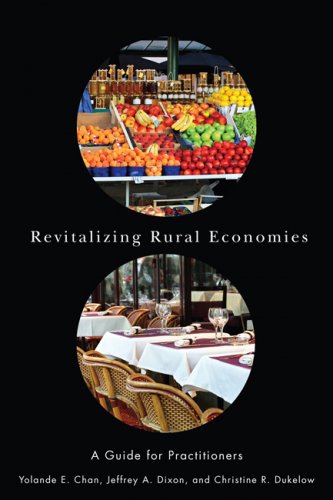A research-based economic development resource for leaders building strong rural communities.
Rural communities in Canada are facing a new reality where traditional economic bases such as agriculture, forestry, and manufacturing have eroded. The digital divide, whereby rural Canada lags in access to broadband, has created further barriers to participating in the emerging knowledge economy. Revitalizing Rural Economies offers practical tools for developers, business people, and community leaders.
The result of a partnership between the Monieson Centre at Queen’s School of Business and entrepreneurs, policy makers, economic development officials, and elected representatives from rural communities across southern Ontario, Revitalizing Rural Economies draws on four years of community-based research to provide strategies for economic revitalization. Integrating case studies and community development guidelines, the authors explore themes such as the building blocks for community economic development (CED), innovation, community assets, vibrant downtowns, social capital accumulation through collaboration and inclusion, and new opportunities for rural economies through creative and value-added businesses.
Designed as a practical guide, this book serves as a primer to CED, while also allowing those familiar with the field to delve deeper. Case studies ground the discussion in the challenges and opportunities facing communities. The book provides ideas and resources to foster the long-term resilience of rural regions.
Table of Contents
I. Understanding Community Economic Development – New Roles for Practitioners
– Community Economic Development – Shifting the Focus to Local Self-reliance and an Innovation Economy
– Community Assets – Essential Building Blocks for CED
– The Importance of the Downtown Core
II. Building Social Capital Through Collaboration and Inclusiveness
– Community Collaboration Techniques
– Strategies for Engaging Youth and New Canadians
III. New Options for Growing the Rural Economy
– Supporting the “Creative Class” and Entrepreneurs
– New Economic Opportunities from Skilled Trades and Value-added Thinking
– Capitalizing on Tourism
IV. Supporting and Sustaining the New Rural Economy
– Technology as the Foundation
– The Economic Role of Healthcare
– Attracting New Investments in Rural Communities
– Goods, Services, and People Movement
Conclusion
Acknowledgments
Appendices
– Detailed Asset Inventory Categories
– Youth Programming and Funding Organizations
– Sample Newcomer Websites
– Government-funded Immigration Programs
– Government-funded Skills Training Programs
– Ontario Travel Market Segments
– Definitions of the Creative Economy





